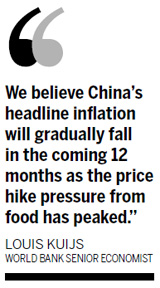Economy
WB raises GDP forecast
By Hu Yuanyuan (China Daily)
Updated: 2011-04-29 09:11
 |
Large Medium Small |

BEIJING - The World Bank on Thursday improved its forecast for China's GDP growth to 9.3 percent this year, from a previous prediction of 8.7 percent, due to strong corporate investment and a robust labor market.
In its latest China Quarterly Update, the World Bank said that the country's economic growth has remained resilient and the economic outlook remains broadly favorable.
"We now project China's real GDP growth at 9.3 percent in 2011 and 8.7 percent in 2012, as a normalized macroeconomic stance, inflation, and somewhat slower global growth is likely to be partly offset by solid cooperate investment and a still robust labor market," said Ardo Hansson, the World Bank's Lead Economist for China.
Inflation risks and the property market remain key challenges facing the country, according to the World Bank.
"It is still too early for the Chinese government to stop the macro tightening. Two-way risks are better dealt with by maintaining fiscal and monetary flexibility," Louis Kuijs, senior economist and the update's main author, said.
|
||||
"We believe China's headline inflation will gradually fall in the coming 12 months as the price hike pressure from food has peaked," said Kuijs.
Food accounts for around 30 percent of the calculation basket of the consumer price index (CPI), a main gauge of inflation. Food price hikes were the main driver behind last year's high CPI figure.
But the World Bank cautioned that China faces pressure from near-record global costs for oil and other commodities.
"There is still price pressure coming in from higher industrial commodity and oil prices, but price hike pressure from non-food categories will be totally offset by the price decrease in the food sector," Kuijs said.
Meanwhile, core inflation remained low, 2.3 percent in March, implying that the country could still absorb some price hikes, he added.
The property market is a particular source of risk to growth, considering the importance of construction to the economy.
"With tension between the underlying upward housing price pressure and the policy objective to contain price rises, interaction between the market and policy measures could lead to a more abrupt than planned downturn in the real estate market," the World Bank said in its report. "Moreover, a property downturn could affect the finances of local governments, which do a lot of the infrastructure investment and are important clients of the banking system."
China's banking regulator last week asked banks to conduct more stress tests on their real estate lending as the government steps up efforts to curb surging housing prices.
Real estate investment, however, has so far remained robust, as an expected slowdown in mainstream housing construction should, in part, be offset by the government's low-rent and affordable housing plan, according to Kuijs.
Property prices in key cities grew slower in March, and some actually declined, as the government's measures to curb rampant real estate speculation and tightened monetary policies began to bite.
Of 70 large and medium cities surveyed more than half experienced a fall in property values or a slower rate of increase.
| 分享按钮 |



